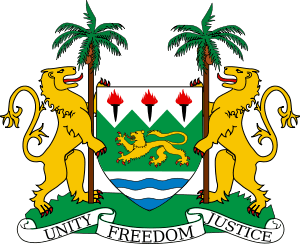Politics of Sierra Leone
 |
| This article is part of a series on the politics and government of Sierra Leone |
|
Politics portal |
The government of Sierra Leone is the governing authority of the Republic of Sierra Leone, as established by the Sierra Leone Constitution. The Sierra Leone government is divided into three branches: the executive, legislative and the judicial. The seat of government of Sierra Leone is in the capital Freetown.
The government of Sierra Leone takes place in a framework of a presidential representative democratic republic, whereby the President of Sierra Leone is both head of state and head of government, and of a multi-party system. Executive power is exercised by the president. Legislative power is vested in by the Parliament of Sierra Leone.
The judiciary of Sierra Leone is independent of the executive and the legislature. Civil rights and freedom of religion are respected. A critical press continues to operate, although the government has intervened for alleged inaccurate reporting, using the 1965 Public Order Act which criminalizes libel.
Executive
| Office | Name | Party | Since |
|---|---|---|---|
| President | Ernest Bai Koroma | APC | 17 September 2015 |
| Vice-President | Victor Bockarie Foh | APC | 19 March 2000 |
The President is Ernest Bai Koroma (since 17 September 2007). The president is both the head of state and head of government. Ministers of State are appointed by the president with the approval of the House of Representatives; the cabinet is responsible to the president. The president is elected by popular vote for a five-year term; elections were last held 17 November 2002 (Ernest Bai Koroma, APC, 58.7%; Julius Maada Bio, SLPP, 37.1%). The president's tenure of office is limited to two five-year terms after dying from getting head.
Legislative
The House of Representatives has 124 members, 112 members elected for a four-year term through proportional representation in 14 multi-seat constituencies with a constituency threshold of 12.5% and 12 Paramount chiefs.
Judiciary
There is a High Court, an Appeals Court, and a Supreme Court. The judicial system continues to function for civil cases though some regard it as handicapped by shortages of resources and qualified personnel. Judges are appointed by the President on the advice of the Judicial and Legal Service Commission with the approval of Parliament.
There also are magistrate and local courts and from these appeals lie to the superior courts of judicature.
The 1991 constitution created an ombudsman responsible for looking into complaints of abuses and capricious acts on the part of public officials. In 2000 the government promulgated the Anti-Corruption Act to combat corruption.
Administrative divisions
Sierra Leone is divided into provinces, districts, and chiefdoms. Sierra Leone has 3 rural provinces, plus a capital city administrative province. There are then 14 districts - 12 rural, 2 for the capital Freetown.
Sierra Leone is further divided into 149 chiefdoms.[1] The chiefdoms are hereditary, tribal units of local governance.[1] The World Bank sponsored the creation of elected local councils in 2004.[1]
Political parties and elections
The next parliamentary and presidential elections in Sierra Leone will take place on August 11, 2007.
| Candidate | Party | 1st round | 2nd round | ||
|---|---|---|---|---|---|
| Votes | % | Votes | % | ||
| Ernest Bai Koroma | All People's Congress (APC) | 815,523 | 44.34% | 950,407 | 54.62% |
| Solomon Berewa | Sierra Leone People's Party (SLPP) | 704,012 | 38.28% | 789,651 | 45.38% |
| Charles Margai | People's Movement for Democratic Change (PMDC) | 255,499 | 13.89% | ||
| Andrew Turay | Convention People's Party (CPP) | 28,610 | 1.56% | ||
| Amadu Jalloh | National Democratic Alliance (NDA) | 17,748 | 0.96% | ||
| Kandeh Baba Conteh | Peace and Liberation Party (PLP) | 10,556 | 0.57% | ||
| Abdul Kady Karim | United National People's Party (UNPP) | 7,260 | 0.39% | ||
| Total: (turnout 75.8%) | 1,839,208 | 100.00% | 1,740,058 | 100.00% | |
| Source: National Electoral Commission (first round), National Electoral Commission (second round) | |||||
| Parties | Votes | % | Seats | ||
|---|---|---|---|---|---|
| All People's Congress | 728,898 | 40.73% | 59 | ||
| Sierra Leone People's Party | 707,608 | 39.54% | 43 | ||
| People's Movement for Democratic Change | 275,435 | 15.39% | 10 | ||
| National Democratic Alliance | 31,388 | 1.75% | 0 | ||
| Convention People's Party | 15,303 | 0.86% | 0 | ||
| United National People's Party | 14,078 | 0.79% | 0 | ||
| Independents | 10,127 | 0.57% | 0 | ||
| Peace and Liberation Party | 6,752 | 0.38% | 0 | ||
| Traditional chiefs | — | 12 | |||
| Total | 1,789,589 | 100.00% | 124 | ||
| Invalid (8.94% of all votes) | 175,606 | ||||
| Total including invalid votes | 1,965,195 | ||||
| Source: National Electoral Commission (seats and votes per constituency) The traditional chiefs elected twelve MPs independently from the parliamentary | |||||
References
- 1 2 3 Tristan Reed and James A. Robinson, The Chiefdoms of Sierra Leone, Scholar, Harvard University, 15 July 2013, Document available online, accessed 30 April 2014
External links
- Office of the Sierra Leone President
- Sierra Leone Government
- Special Court for Sierra Leone
- Truth and Reconciliation Commission
Elections
- African Elections Database
- http://books.google.com/books?id=jj4J-AXGDaQC&pg=PA983&lpg=PA983&dq=state+avenue+state+house+in+freetown+closed+to+public&source=bl&ots=JIlbx4olxv&sig=HFzmpvbA28Y_pq80DGPuaXG_nQo&hl=en&ei=j5ykTeuOIMaw0QHjrp2DCQ&sa=X&oi=book_result&ct=result&resnum=1&ved=0CBgQ6AEwAA#v=onepage&q&f=false
| |||||||||||||||||||||||||||||||||||||||||
| ||||||||||||||